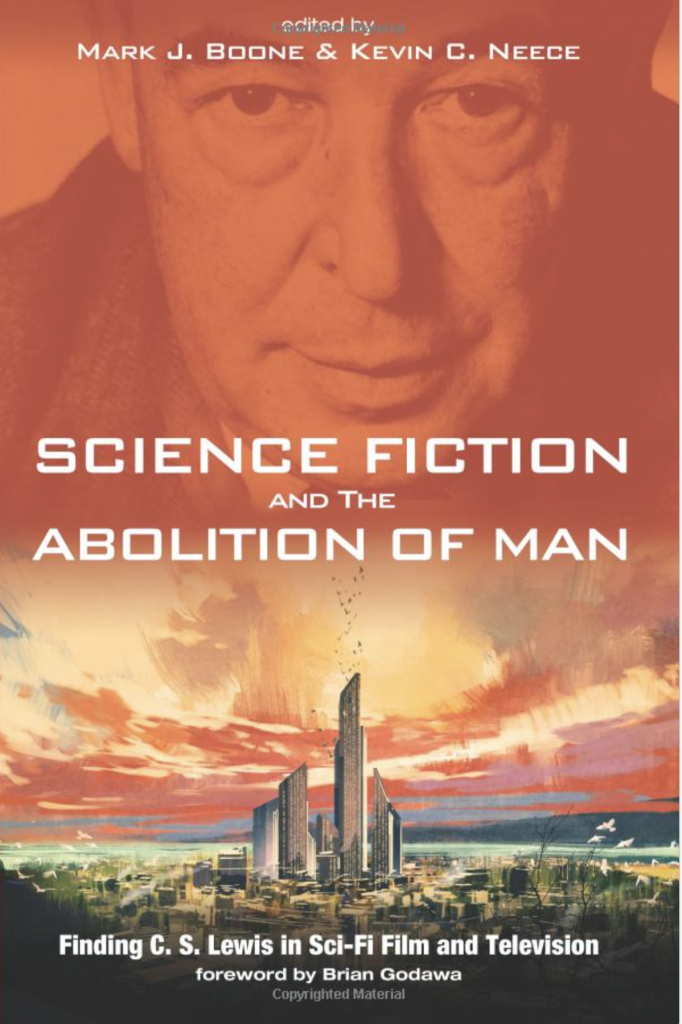This is a fresh and unique interview with some very smart and creative guys, Stephen Burnett and Zackary Russell.
We talk about how imagination comes into play with theology, the arts, creativity, the Bible.
We go deep.
This is a fresh and unique interview with some very smart and creative guys, Stephen Burnett and Zackary Russell.
We talk about how imagination comes into play with theology, the arts, creativity, the Bible.
We go deep.
I just published this article on Speculative Faith.
It’s called “Spiritual Warfare Novels, Fantasy, and the Bible”
p.s. the book is only on sale until this Friday, Aug 31.

I wrote the foreword to this mind-bending exploration of all things Lewis and sci-fi in media entertainment.
Here is the description:
The Abolition of Man, C. S. Lewis’s masterpiece in ethics and the philosophy of science, warns of the danger of combining modern moral skepticism with the technological pursuit of human desires. The end result is the final destruction of human nature. From Brave New World to Star Trek, from steampunk to starships, science fiction film has considered from nearly every conceivable angle the same nexus of morality, technology, and humanity of which C. S. Lewis wrote. As a result, science fiction film has unintentionally given us stunning depictions of Lewis’s terrifying vision of the future. In Science Fiction Film and the Abolition of Man, scholars of religion, philosophy, literature, and film explore the connections between sci-fi film and the three parts of Lewis’s book: how sci-fi portrays “Men without Chests” incapable of responding properly to moral good, how it teaches the Tao or “The Way,” and how it portrays “The Abolition of Man.”
You can get it on Kindle here.
You can get it in paperback here.
Check out this YouTube video on God Against the gods: Yahweh Vs. Ba’al.
Did you know that the Bible uses subversion regarding pagan imagination? Biblical writers took the same poetic imagery and description that the Canaanites used of Ba’al and they redeemed it by using that exact same language of Yahweh. This isn’t syncretism (mixing religions), like liberal scholars and other Bible-haters try to promote, this is subversion. Redemption of pagan imagination. See for yourself in this short video.
This is only one part of the lecture. Get the full version here.
Or check out the book at Amazon.com here.
Check out this YouTube video on God Against the gods: Yahweh Vs. Leviathan.
Some people think that Leviathan in the Bible is a whale or a sea dinosaur. It’s not. It’s a mythical sea dragon of chaos. And it appears in all the ancient Near Eastern religions, including Judaism and Christianity. Not only that, but it has multiple heads. I kid you not. Read the Bible a little closer with me in this presentation and you’ll discover what the Bible really says about Leviathan.
This is only one part of the lecture. Get the video full version here.
Or check out the book at Amazon.com here.
Check out this YouTube video on God Against the gods: What C.S. Lewis and J.R.R. Tolkien Understood about Myth.
I explain what the definition of Myth is, and Mythopoeia, concepts that Lewis and Tolkien trafficked in — as does the Bible.
Christians don’t need to be afraid of this word, “myth” as if it means the Bible is false or fictional. It doesn’t. It’s about the stories that give meaning and purpose to our lives. Transcendence.
Lewis said, “If God chooses to be mythopoeic, should we choose to be mythopathic?” Find out what that means.
This is only one part of the lecture. Get the full version here.
Whenever I consider that I have something important to say about faith, imagination, and/or apologetics, I usually discover that C.S. Lewis has already said it long before I could, and he has said it better than I will. True to form, the title of my book Myth Became Fact, is actually the title of a famous essay by the late Lewis that describes the heart of Christianity as a myth that is also a fact. He comforts the fearful modernist Christian whose faith in the Bible as a book of doctrine and abstract propositions is suddenly upset by the frightful reality of the interaction of holy writ with legend, pagan parallels, and mythology.
Rather than deny the ancient mythopoeic nature of God’s Word as modern Evangelicals tend to do, Lewis embraced it as a reflection of God’s preferred choice of concrete communication over abstraction (the worshipped discourse of the modernist). He understood myth to be the truth embedded into the creation by the Creator in such a way that even pagans would reflect some elements of that truth. Thus, when God Himself incarnates truth into history in the life, death, and resurrection of Jesus Christ, it is no surprise that it takes on mythopoeic dimensions reflected in previous pagan notions of dying and rising gods. Continue reading